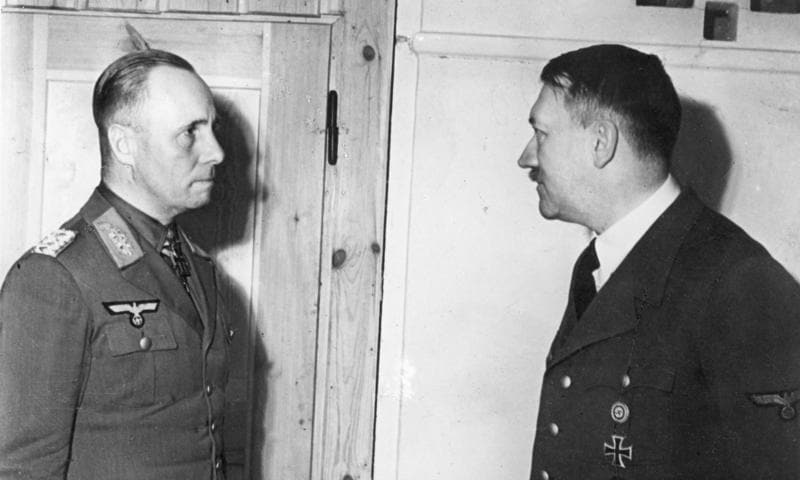At one point, according to the book, he complained to his chief of staff, John F. Kelly, a former Marine general, asking why he and others couldn’t be “totally loyal” to him, like the “German generals in World War II.”
“You do know that they tried to kill Hitler three times and almost pulled it off?” Kelly allegedly responded.
So were Adolf Hitler’s generals yes men? Or did they really plot to assassinate him three times and get close once?
In total, there were at least 42 plots to assassinate Hitler, according to historian Roger Moorhouse in his book “Killing Hitler: The Plots, the Assassins, and the Dictator Who Cheated Death.” Of those, at least 10 attempts involved German generals.
One of the earliest came in 1938, before World War II even began. A handful of generals led by Hans Oster conspired with government ministers and diplomats to overthrow Hitler, and kill him if necessary, believing he was about to thrust Germany into a massive war it could not win. The plot fell apart when British Prime Minister Neville Chamberlain negotiated a peace treaty, heading off the immediate threat of war. Most of the generals involved quietly joined the German resistance; Oster was executed by the Nazis in 1945.
Gen. Hubert Lanz developed another plot in 1943. When Hitler arrived for a scheduled visit to the eastern front in Ukraine, Lanz and other officers planned to surround Hitler and his security with tanks and, if they resisted arrest, blow them to bits. Hitler ruined the plan by visiting a different spot than they had expected. Lanz was later convicted of war crimes at Nuremberg.
Maj. Gen. Henning von Tresckow organized a number of assassination attempts, including a bomb in a suitcase on Hitler’s plane, which failed to detonate when it froze in the cargo hold, and a bomb timed to go off during Hitler’s appearance at an armory, foiled when he raced through the building before the timer expired.
The best-known plot — probably the “almost pulled it off” to which Kelly was referring — was the 20 July Plot, sometimes erroneously called Operation Valkyrie, which was the name of the continuity-of-government plan that Tresckow and his conspirators wanted to use to take over after they killed Hitler. Col. Claus von Stauffenberg — played by Tom Cruise in the 2008 film “Valkyrie” — placed a bomb in a suitcase close to Hitler in a conference room at his Wolf’s Lair retreat. Stauffenberg was driving away when he heard the bomb go off and presumed Hitler dead.
I wasn’t. An aid had moved the briefcase before it blew up, and Hitler was protected from the blast by a table leg. Four others died, and many more were injured. If the plotters had hoped to decapitate the Nazis, the attempt had the opposite effect: Hitler’s doctor recalled him saying over and over, “I am invulnerable. I am immortal,” according to Moorhouse.
In the following days, Tresckow killed himself, Stauffenberg died by firing squad, and thousands of alleged conspirators were rounded up, tortured and executed — including a raft of generals. Even Field Marshal Erwin Rommel, a national hero and talented commander, was caught up in the dragnet and forced to kill himself.
The next year, as the Allied forces closed in, Hitler — who had survived dozens of attempts on his life — died by suicide.
Historians are split on to what degree, if any, the generals plotting against him were motivated by a desire to stop Nazi atrocities such as the Holocaust. Many were aware of atrocities for years before they began to plot against Hitler and did nothing. Some government may have been motivated more by the Nazis pushing aristocrats out of than by high-minded ideals like democracy or human rights. Even the generals who wanted to kill Hitler to end the war planned to claim in their surrender terms much of the territory Germany had taken during the Nazi regime.
Like Trump, Kelly has previously been criticized for his questionable takes on history. In 2017, he told Fox News host Laura Ingraham that the Civil War was caused by “the lack of an ability to compromise” and that Confederate Gen. Robert E. Lee was “an honorable man,” views popular among the now-discredited “ Lost Cause” hagiography to which many students in the 20th century were subjected.
Hitler’s generals are, by and large, not held up as principled heroes or honorable men, not even the ones who plotted to kill him. They are remembered as the men who stood by while Hitler murdered millions.
